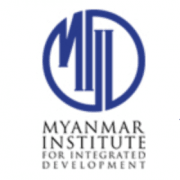About Myanmar institute for integrated development (miid)
Myanmar Institute for Integrated Development (MIID) is a non-profit organization based in Yangon, Myanmar. The institute aims to promote meaningful participation and inclusion of ethnic communities in Myanmar's economic, social, and political transition by supporting a people-centered and sustainable approach to economic and social development.
MIID was established in 2014 with the vision of creating an inclusive society where all individuals have equal opportunities to participate in the country's development process. The institute believes that sustainable development can only be achieved through the active involvement of all stakeholders, including marginalized communities.
The primary focus of MIID is on promoting community-driven development initiatives that are tailored to meet the specific needs of different ethnic groups. The institute works closely with local communities to identify their needs and priorities and develop programs that address these issues effectively.
One of MIID's key areas of focus is on promoting sustainable agriculture practices among smallholder farmers. The institute recognizes that agriculture plays a crucial role in Myanmar's economy, particularly for rural communities. However, many smallholder farmers lack access to modern farming techniques or markets for their produce. MIID works with these farmers to provide training on sustainable farming practices such as crop rotation, soil conservation, pest management, and irrigation techniques.
Another area where MIID has made significant contributions is in promoting women's empowerment. Women play a vital role in Myanmar's economy but often face significant barriers when it comes to accessing education or employment opportunities. MIID works with women-led organizations across the country to provide training on leadership skills, financial management, entrepreneurship skills as well as access credit facilities.
MIID also focuses on promoting peacebuilding initiatives across different ethnic groups within Myanmar. The country has been plagued by conflict between various ethnic groups over several decades resulting from political instability or resource competition among others factors leading up until today’s situation which requires urgent attention from all stakeholders involved including civil society organizations like MIID who work towards building bridges between different communities through dialogue and conflict resolution initiatives.
In conclusion, MIID is a non-profit organization that has made significant contributions to promoting sustainable development in Myanmar. The institute's focus on community-driven development initiatives tailored to meet the specific needs of different ethnic groups has been instrumental in promoting inclusive economic and social development across the country. MIID's work in promoting sustainable agriculture practices, women's empowerment, and peacebuilding initiatives is commendable and serves as an inspiration for other organizations working towards similar goals.
